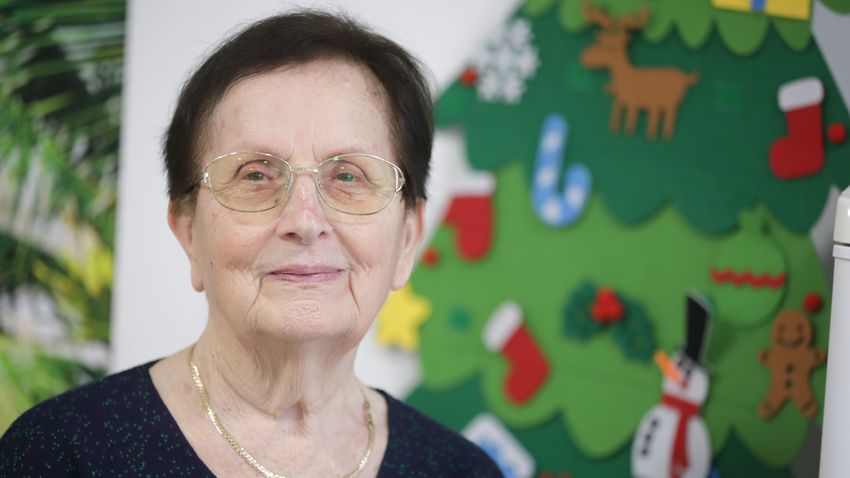Mária Molnár, originally from Zala, has been living in a nursing home for four years. He was first placed in the Maroshegy home of the Kossuth Zsuzsanna Social Institution in Fehérvár, but for almost two years he has been a resident of the Farkasvermi út home. We meet here, and Aunt Marika – whom I already know a little from before – welcomes you in her fit, friendly way. He immediately handed me a journal entry he had written about how he lived through the days of Covid. She wrote the text for a competition, she reveals, and it shows that Aunt Marika is still very active and mentally fresh, it is hardly visible that she is 87 years old. What is all this due to? Actually, I didn’t want to say that, but the way the old woman’s life path and attitude unfolded in front of me, I can roughly guess. He can live his days with such acceptance and patience, which certainly helps a lot in maintaining his health and good mood. According to him, he does not find fault in others and can adapt quite well.
Marika, who was born in Zalaboldogfá, came to Székesfehérvár thanks to her work – it turns out during our conversation. After high school, he wanted to major in the humanities, but in the end he obtained a degree in economics, and over time he fell in love with this science. He started working in a Budapest hotel as a merchandise salesman. He was able to do his job well, because he soon received an offer that he couldn’t refuse: he was asked to become a director at the Golden Csillag Hotel in Dunaújváros. Mária Molnár accepted the task after some hesitation, on the condition that she wanted to live in Székesfehérvár. This was fulfilled for him, he was given an apartment from which he went to work in Dunaújváros every day. Not much time passed and she met her husband, with whom they lived together for almost forty years, and when the man (who worked as a firefighter) passed away a few years ago, Aunt Marika decided that she did not want to be a burden on her son and family (although no one suggested that to her, that it would be a burden, in fact), he prefers to move into a home, if that is the case. Finally, a fall required her to be placed in need of supervision. This happened about four years ago, and Aunt Marika now really feels at home in the home, currently on Farkasvermi út. He claims: this is a permanent location, he will stay here because he likes to live here.
He has a serious daily routine: getting up early, then every day (even in winter!) a short walk and a little exercise in the garden. After he goes up to his room, he eats breakfast, then does his homework until the usual morning sessions begin at ten o’clock. The latter include, for example, yoga, reading, a Reformed or Catholic ceremony, a memory game, and the like. When that’s over, lunch comes, then some TV, then quiet rest with coloring (rarely sleeping), then body care again, because sometimes this and that hurt – and then it’s time for dinner. There is also reading, of course, but sometimes there is time for that only on weekends – adds the very busy aunt Marika, who shares the room with two other elderly women.
Christmas passes similarly, only then the programs and the decoration of the home are tuned to the holiday. The atmosphere will be more intimate at this time, there is joint singing and games, and the workers will also prepare a show for the residents. Guests come to perform, there are small gifts, more attention is paid so that the soul can be filled, says Aunt Marika, whose family takes her home every Christmas Eve and spends that day with her sons. But when he returns, he celebrates with the community again.
However, the memory of childhood Christmases still lives in him. With heavy snowfall, when they rolled well in the snow. A Nativity play is also recalled, in which Aunt Marika was given the role of an angel as a child. “I went up the ladder in a royal blue dress,” she recalls, just like when her father still secretly walked back and forth under the window so that the children would think that Jesus was coming to bring the Christmas tree. Over time, of course, the ugliness was revealed, but the mysterious identity of Jesus, the experience of waiting and the miracle remained a lifelong experience…

/nginx/o/2023/12/24/15798712t1h07b4.jpg)
